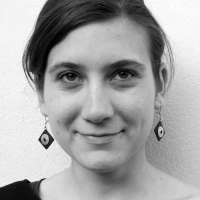
Aneta Gorczynska
I have a double background in archaeology and coastal geomorphology. I am interested in the socio-ecosystem of coastal areas during the Holocene. More specifically, I am working on the comprehension and chronology of coastal morpho-sedimentary processes such as the development of dune systems and the infilling of estuary valleys over the last eight millennia. By analysing coastal archaeological remains, I am also attempting to determine the relationship between the settlement patterns of pre- and protohistoric societies and environmental changes.
-
SHOCOBBA -Dynamiques Sédimentaires HOlocènes de la Côte Ouest de la Bretagne : exemple de la baie d’Audierne. (Holocene sedimentary processes on the western coast of Brittany: example of the Bay of Audierne)
Description: As part of the Geopras project, methodological developments aimed at providing a more accurate reconstruction of palaeogeographic changes along the Atlantic coast since prehistoric times have been initiated. The Bay of Audierne has been identified as a study site for an extended research programme. The aim of the SHOCOBBA oceanographic survey is to investigate the marine compartment of the land-sea continuum, focusing on sediment filling in the nearshore areas of the bay. The objectives are to determine the sediment thickness, to locate incised fossil valleys and to study their morphology offshore by seismic reflection surveys.
Period: 2023
Funder: ANR Geopras and French oceanographic fleet
Project coordinator: Aneta Gorczyńska
Role in the project: Mission leader
-
GEOPRAS - GEOarchaeology and PRehistory of Atlantic Societies
Description: The GEOPRAS consortium comprises seven partners that have been involved for several years in coastal archaeology. Our programme studies the coastal societies of recent Prehistory (Mesolithic and Neolithic) on the French Atlantic shores in order to understand their social and economic organization and the role they play in broader historical dynamics such as neolithization. Characteristics such as the accumulation of goods through storage, specialised modes of production, and the emergence of a social hierarchy or a sedentary lifestyle are often attributed to these coastal populations, on the basis of ethnographic documents from the last two centuries. However, each of these social manifestations must be described according to regional environmental variables, without evolutionary preconceptions. Our research hypothesis is that environmental dynamics have greatly facilitated certain forms of historical evolution. This encourages us to determine with greater precision the nature of these environmental transformations, then to analyse human networks at the continent-ocean interface.
Period: 2022-2025
Funder: The French National Research Agency (ANR n°CE27-024)
Project coordinator: G. Marchand, P. Stéphan and F. Verdin
Role in the project: Participant, Postdoctoral researcher
-
BAGADOU - BAllade Géologique et Archéologique autour de la Dynamique Dunaire OUest-Bretonne (Geological and archaeological exploration of dune dynamics in western Brittany)
Description: The objective of this project is to use virtual reality to present the Holocene dynamics of the dune massifs on the western coast of Brittany. Over the last 7000 years, four major phases of coastal dune migration have been identified (Gorczyńska et al., 2023). Numerous archaeological remains (from the Neolithic to the Modern Period) have been progressively buried by the sand, demonstrating that coastal societies had to adapt to these environmental changes. The objective is to provide a 360° spatial reconstruction of coastal environments at different periods and to propose a model allowing the user to navigate from one reconstruction to another, the timescale being a key concept and a gateway into these palaeo-landscapes. The virtual reality illustration of the flooding by sand of one or more different sites ( such as a church, or a megalithic monument...) would complete this spatio-temporal experience by allowing the user to understand the impact of natural geological processes on human settlement and/or activities.
Period: 2023-2024
Funder: eLTSER platform "Zone Atelier Brest-Iroise"
Project coordinator: Estelle Leroux and Aneta Gorczyńska
Role in the project: Project co-leader
-
SeaLex - The SEA as a Long term socio-ecological EXperiment
Description: The SeaLex project aims at contributing significantly to the contemporary societal debate about the impacts of climate changes on coastal human populations through a retrospective view of the long‐term trajectories of socio‐ecosystems, especially in terms of social adaptability and resilience, from the start of the Holocene to present‐day along the land‐sea continuum in several relevant North Atlantic Ocean coastal areas (Brittany, Aquitaine, Jersey, Saint-Pierre-et-Miquelon, Newfoundland).
Period: 2020-2024
Funder: The Graduate School ISblue
Project coordinator: P. Stéphan
Role in the project: Participant
-
PADMé - Dynamique d’anthropisation des milieux côtiers en Bretagne Nord : Pollen et ADN ancien de la fin du Mésolithique à nos jours (Anthropisation dynamics of coastal environments in North Brittany: Pollen and ancient DNA from the end of the Mesolithic to the present day)
Description: The objective of this project is to conduct a comparative study of pollen grain assemblages and ancient DNA sequences preserved in the sediments of the Kerallé valley at Plouescat. The pollen record reflects changes in vegetation marked by an increasing human impact since the Neolithic period, and will be complemented by the DNA approach to detect the presence of groups of animals and plants, both wild and cultivated. This combined approach will provide an opportunity to discuss the history of this area and the various stages of human-environment interaction (deforestation, cultivation, domestication, pastoralism) in relation to the archaeological data studied in parallel.
Period: 2021-2023
Funder: The Graduate School ISblue
Project coordinator: Muriel Vidal
Role in the project: Participant
-
COCODILE - Human COastal COmmunities and Environmental Changes During last millenia in InsuLar ContExts
Description: The main objective of the COCODILE project is to federate and support emerging research activities within the IUEM, and more broadly within the scientific environment of Brest-Nantes, focusing on the relationship between society and the coastal environment over the 'long term' (since the Mesolithic period, i.e. the last 10,000 years) in Western Europe.
Period: 2017-2020
Funder: LabexMER, IUEM
Project coordinator: P. Stéphan
Role in the project: Participant, PhD student